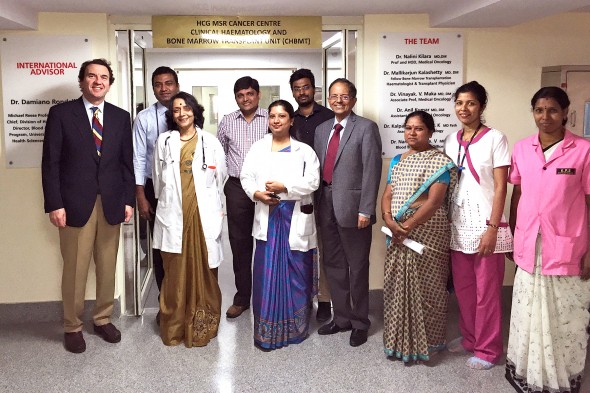Physician helps launch bone marrow transplant unit in India

Damiano Rondelli (left) helped launch a bone marrow transplant unit at M.S. Ramaiah Medical College in Bangalore, India.
A bone marrow transplant can mean the difference between life and death for people with blood cancers and related disorders, but many patients in India can’t afford the high treatment costs.
To make the treatment more widely available, a UIC physician helped launch a bone marrow transplant unit at M.S. Ramaiah Medical College in Bangalore, India.
The five-bed unit was established by local physicians and hospital administrators working with Damiano Rondelli, director of the blood and marrow transplant program at UI Health.
Bone marrow transplants in India are done mainly at unaccredited, nonacademic institutions, where the treatments are prohibitively expensive and infection control varies.
Ramaiah wants to become the first internationally accredited bone marrow transplant program in India, providing transplants under high standards of care and at a significantly lower cost. The service will be subsidized by revenues from the for-profit hospital associated with the medical college.
“Every patient gets the same treatment, regardless of what they can pay,” said Rondelli.
Rondelli visited Ramaiah at the invitation of Bellur Prabhakar, UIC College of Medicine professor and associate dean for technological innovation and training.
Prabhakar had met with leaders at Ramaiah to discuss working together through UIC’s Center for Global Health.
“One of the things they wanted to do was to establish a world-class bone marrow transplantation unit,” said Prabhakar.
The need for bone marrow transplantation is high in India, a country of more
than 1 billion people. Southeast Asians have a higher genetic risk for thalassemia, a disorder of hemoglobin, and bone marrow transplantation is the only cure.
Rondelli helped the hospital design the unit and develop standard procedures for transplants. He said the program, which performed its first transplant in February, could be ready for international accreditation in two years.
Rondelli says the partnership between UIC and Ramaiah could lead to clinical research programs and training, including advanced techniques for freezing and storing stem cells and the treatment of sickle cell disease and thalassemia.
Categories
Campus, Patient Care, UI Hospital
Topics
bone marrow transplant, global health, leukemia, sickle cell disease, transplant
